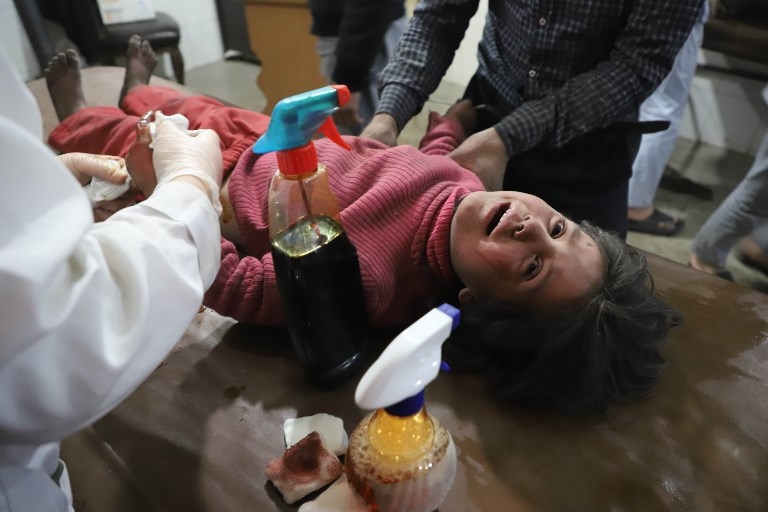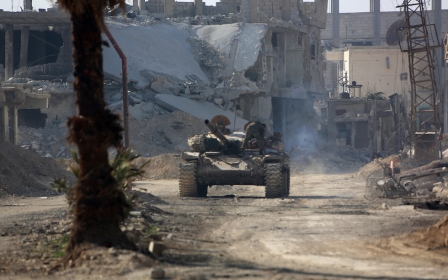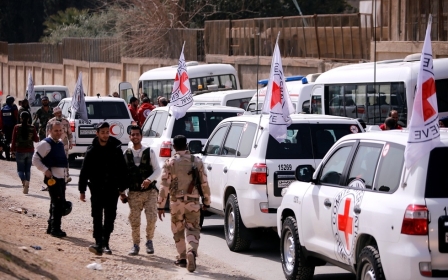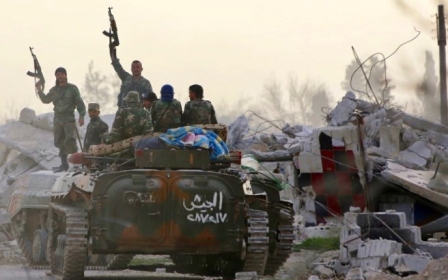Planned aid convoy to Syria's Ghouta postponed, says Red Cross

An aid convoy planned for Thursday to bring assistance to besieged civilians in Syria's rebel enclave of Eastern Ghouta will not go through, the International Committee of the Red Cross said.
"The convoy for today is postponed, as the situation is evolving on the ground, which doesn't allow us to carry out the operation in such conditions," ICRC spokeswoman Ingy Sedky told AFP.
The joint convoy between the ICRC, United Nations, and Syrian Arab Red Crescent was expected to deliver aid to Eastern Ghouta's main town of Douma on Thursday.
The head of the United Nations children's agency UNICEF said on Thursday the besieged Syrian enclave of eastern Ghouta had become a "hell on earth" for children and aid was urgently needed.
"We need in the humanitarian community a chance to deliver assistance. Convoys need to come in with food and supplies, and the last convoy was only half unloaded," said Henrietta Fore.
"5.8 million Syrians are on the move, whether externally or internally ... and half of this is children, so children are affected most," Fore added.
A reporter contributing to AFP saw the trucks on Thursday parked on the edges of Eastern Ghouta, at the government-controlled Wafideen checkpoint.
It marks the second time this week that desperately needed aid operations to Eastern Ghouta have been disrupted by military developments.
On Monday, 46 trucks of assistance entered the area in the first aid provision since a new offensive against the enclave began on 18 February - but they had to cut their deliveries short and leave due to heavy bombardment.
Nearly half of the food aid could not be delivered while the UN said Syrian authorities removed some medical and health supplies from the trucks.
Eastern Ghouta has been besieged since 2013, making food, medicine, and other daily goods exceedingly difficult to access.
Aid deliveries into the area require permissions from all warring sides.
The latest assault on Eastern Ghouta began with an intense bombing campaign on 18 February, followed by a ground offensive.
Government forces have since captured more than half of the rebel-held parts of the area and killed more than 890 civilians, according to the Syrian Observatory for Human Rights.
The toll includes at least 87 people killed on Wednesday.
Breathing difficulties
On Wednesday, dozens of people were treated for breathing difficulties after air strikes slammed into Syria's Eastern Ghouta, a monitor said, with medics reporting symptoms consistent with a toxic attack.
The Britain-based observatory said at least 60 people in the besieged rebel enclave were left struggling to breathe after air strikes and barrel bombs hit the towns of Saqba and Hammuriyeh.
Doctors at one medical facility in Eastern Ghouta said they treated at least 29 patients with signs of exposure to chlorine, according to the Syrian American Medical Society (SAMS).
SAMS is a medical charity that supports hospitals in Eastern Ghouta and other rebel-controlled zones in Syria.
It did not report any deaths but said it was likely that more victims were being treated at other clinics.
"Due to chlorine attack in #EastGhouta, patients are struggling with symptoms such as severe dyspnea, sweating, congestion of mucus membranes, severe runny nose, wheezing & conjunctival erythema," SAMS wrote on social media late Wednesday.
"The emotional trauma from these attacks can not be measured."
Dyspnea is shortness of breath. Conjunctival erythema is redness of the eye caused by dilation of the blood vessels.
Eastern Ghouta is facing a blistering offensive by Russian-backed government forces and allied militiamen, who are seeking to clear out rebels from the capital's outskirts.
Government forces have been repeatedly accused of using chlorine on Eastern Ghouta in recent weeks, which both the government and its ally Russia have staunchly denied.
United Nations investigators say government forces used chlorine as a weapon at least three times between 2014 and 2015, as well as sarin gas in 2016.
Air strikes continued to hit the remaining rebel-controlled parts of Ghouta on Thursday.
New MEE newsletter: Jerusalem Dispatch
Sign up to get the latest insights and analysis on Israel-Palestine, alongside Turkey Unpacked and other MEE newsletters
Middle East Eye delivers independent and unrivalled coverage and analysis of the Middle East, North Africa and beyond. To learn more about republishing this content and the associated fees, please fill out this form. More about MEE can be found here.




